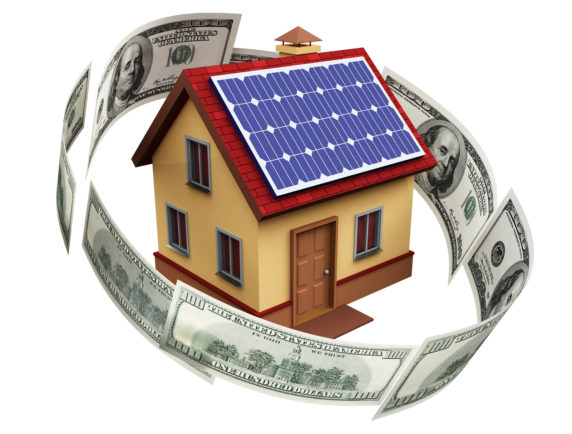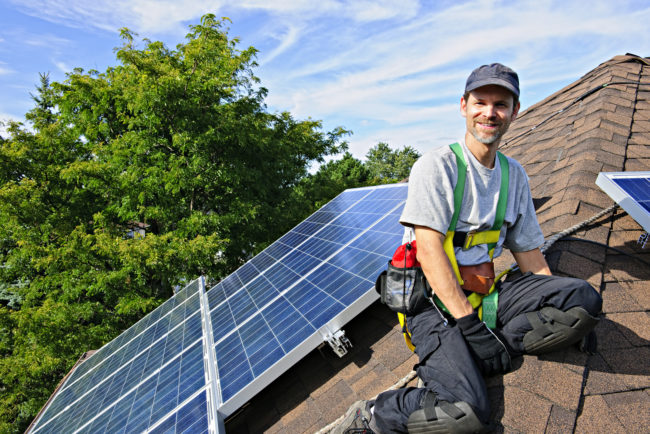Do Solar Panels increase the value of a home?
Depending on where you live (and quite literally what the weather's like), solar panels are huge right now. But how much do they actually increase the value of a home?
They knock on your door at all hours. Check your video surveillance and you’ll find they waved at the camera while backing away from the door, wearing an amazingly goofy grin. “They” are the smooth-talking, sensible-sounding salesmen and women of solar panels.
It’s hard not to be tempted by their spiel – who doesn’t want to save money on their power bill every month?
Part of the sales pitch is that solar panels on a home’s roof raise the home’s value. Is it a come-on to get homeowners to buy solar panels, or is it true?
It depends. And the distinctions are important for agents to understand when determining the current market value of their clients’ homes.
And this understanding grows more imperative every year. Currently, 2 million U.S. homes have solar installed, an increase of 1.4 million in just 5 years.
As prices fall, installations will increase, according to the Department of Energy.
So, let’s bring you up to speed on what we know and what to expect to help ensure your CMAs continue to kick hiney over AVMs.

There’s a new study by Zillow that finds “During the past year, homes with solar-energy systems sold for 4.1% more on average than comparable homes without solar power,” according to Sarah Mikhitarian, senior economist with Zillow.
She goes on to warn that “The sale premium varies substantially by market,” not mentioning whether Zillow separated the homes with owned systems from those with leased systems.
It’s a critical distinction and any study that doesn’t consider it is useless, in our opinion, and here’s why:
In 2015, researchers Sandra Apomatis and Ben Hoen of the Lawrence Berkeley National Laboratory conducted a study of the solar = increased home value question.
At that time, comparables for homes with solar photovoltaic (PV) systems were few and far between – a conundrum for appraisers. Because of this, “PV systems on some U.S. homes still receive no value during an appraisal,” according to the study’s authors.
In their research of 23,000 homes across six states, they determined that when the solar system was purchased outright by the homeowner, and not leased from the company, the home realized an average of $15,000 in increased value.
During this same time period, Fannie Mae released new guidelines for home appraisers, stating that value can be added to a home with a solar power system, provided the feature is in-demand in the area.
Again, this does not apply to leased solar systems, only those purchased by the homeowner.
“If it’s leased, it has no impact on value,”
claims a blog post at McKissock Learning.
That’s not entirely accurate, however.
Since the new owner of the home is required to take over the lease (in many cases), some appraisers claim that a leased system may have a negative impact on value.
Let’s take a look at this in action.
A homeowner in El Granada, Calif “was happy with the leased solar panels he installed a few years back. When he decided to sell, he found a buyer who also appreciated the environmental benefits of solar panels,” relates Jeff Brady at WBUR.org.
The transaction hit a major snag, however, because the buyer failed to read the solar lease agreement until the last minute. That’s when he discovered that the lease still had 16 years to run.
Did he pitch a you-know-what? Of course, and the seller and the listing agent scrambled to come up with $10,000 to appease the buyer into assuming the remaining lease.
In this case, at least, a leased system decreased this home’s value by $10,000.
Then there are the lease agreements used by some solar companies that include language stating that the solar system is personal property. As you know, personal property isn’t considered when determining the market value of a home.

There’s more to boning up on residential solar systems than using the knowledge to help you compile more accurate CMAs.
There are legal and disclosure angles to consider as well.
Disclosure of the solar system’s lease terms and a buyer-signed addendum acknowledging receipt and review of the lease will go a long way in preventing problems for agents and sellers alike, according to the pros at CRES Insurance Services.
Learn how to protect yourself from a law suit by reading the advice in the aforementioned article.
Hopefully, you have an appraiser on speed dial so that you can learn how solar affects home prices locally. If not, perhaps it’s something your local association is studying.
If all else fails, pray for comps with solar systems and treat an owned solar system as an amenity when comparing the subject to comps, hoping the appraiser will do the same.
Create a viral marketing campaign with content that gets views – here’s how:

Need some motivational real estate quotes? Here are 50 quotes that'll inspire you to greatness. As a bonus, we've thrown in 6 lead tactics to go with the quotes.
August 12, 2015

Finding a niche is one of the best things you can do when you're trying to stand out online, and given the events of the year, landlords are looking like they're going to be a hot group to target moving forward. Here's why focusing on the landlord lead may be the best decision you've ever made:
July 21, 2020

How do you stand out from the crowd and keep your geographic farming efforts running strong? Today we're breaking down some of the best techniques to dominate your area, rank higher on search engines and get more leads.
April 30, 2019
Let’s boost your lead gen.

Connect your local MLS to Facebook to promote all properties in your MLS or create any specific niche catalog of listing you want to sell using dynamic Facebook ads. Here are just some of the ways you can use these new types of ads to stand apart from the competition: